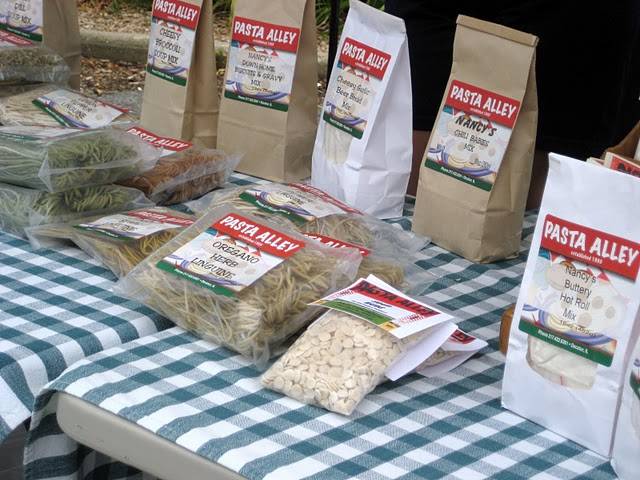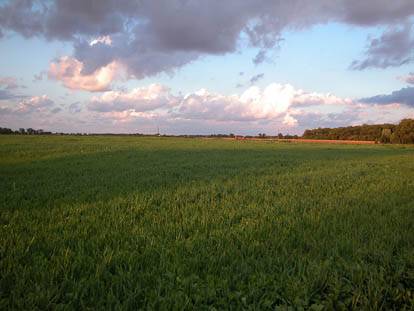An ongoing examination of what it means to “eat local.“ Please read the previous stories here:
Part 1 & Part 2: A profile of local food blogger Scott Koeneman
Part 3: Farmers’ Markets
Part 4: CSAs
Part 5: Common Ground, Strawberry Fields, & Bacaro
Part 6: Triple S Farms
———-
Vendor: Pasta Alley Sells: Pasta, pasta sauces, soups, bread mixes, dipping oils
Owner: Jeremy Maupin Location: Decatur, Ill.
Purchased: 2007 Website: http://www.pastaalley.net/
Type: Dry Goods
Pasta Alley owner Jeremy Maupin and his wife own and operate three group homes for developmentally disabled adults under the name J and J Maupin Group Homes, Inc.; the Maupins also own a workshop where their clients work each week to develop vocational skills.
Maupin said that he and his wife bought Pasta Alley in 2007, when the job market in Decatur was “looking grim.”
“[My wife and I] were looking for clients of ours with disabilities to have work in our workshop,” Maupin said. “I had gotten word that there was an owner/operator of Pasta Alley in Robinson, Ill., who was looking to sell her business…I thought it was a perfect fit.”
Shortly thereafter, the Maupins bought the business and moved it to Decatur. They then divided the labor in the shop to fit the skills and limitations of 28 of their clients.

Maupin said that workshop tasks include making and mixing the pasta, bagging dry pasta, and labeling and sealing the bags; the more social individuals help the Maupins with sales.
“We do an assessment of our clients and plug them in where we can,” Maupin said.
He noted that while his clients “do really well” at work, they still have individual struggles.
“That aspect of running the shop is a challenge,” Maupin said, “but having my clients participate in meaningful work is also the biggest reward.”
Another challenge, Maupin said, has been keeping up with consumer demand; Pasta Alley is currently at the peak part of its season, which is from July 1 through the end of fall. But Maupin is not one to complain about the success of his business.
“Our business has grown every year,” Maupin said. “Last year we had about $100,000 in gross sales; the year before we had $50,000 and this year we should have over $130,000.”
Pasta Alley participates in Bloomington, Springfield and Peoria farmers’ markets, in addition to selling at Urbana’s Market at the Square. The company also participates in a circuit of craft shows and festivals, and sells its product in a few retail stores. Locally, Pasta Alley products can be found at Great Harvest Bread Co. in Champaign and Bloomington, and at Country Market in Springfield.
“The reception [in Urbana] has been fantastic,” Maupin said. “There is a wide spectrum of customers – college students, people of all ages and ethnicities. We have all kinds of flavors, and that brings all kinds of people to our stand. It has been really successful for us.”
Maupin said that C-U patrons seem to be interested in learning about the origins of their food, noting that customers often ask with what ingredients Pasta Alley makes its products.
“Some people are skeptical of a homemade product…They ask about nutritional statistics – fat content, saturated fat,” Maupin said. “Once people learn that it is made with semolina flour, water, a little olive oil, and whatever spice or herb we use to flavor it, they are satisfied to know that it is a very natural product.”
Maupin said that Pasta Alley purchases semolina flour, which is used for baking, in bulk from a distributor, and buys gluten-free products from Andrea’s Gluten Free in St. Louis. Herbs and spices hail from Oregon Spice Company in Portland and from a spice company in Decatur, Illinois.
———-

Vendor: Moore Family Farm Sells: Produce, Meat, Eggs
Owners: Jim and Diann Moore Location: Watseka, Ill.
Puchased: 1985 Size: 105 acres total; 60 tillable acres
Type: Permaculture Website: http://www.moorefamilyfarm.com/
Jim and Diann Moore purchased the 105-acre Moore Family Farm from Jim’s grandmother in 1985; they have been vendors at the Urbana farmers’ market, Market at the Square, for 23 years, and have been the sole providers for the Prairieland CSA since 2003.
The farm’s size and its sandy soil make corn and soybean farming impossible, Diann said, so there is “no reason to own larger farm equipment.” The Moores began raising livestock “the way the bank told them to” in 1985, and a short amount of time, that “ran them into the ground.”
“At that time, pork prices went to eight cents and we lost money…something had to change,” Diann said. “We decided to start vegetable gardening.”
Diann said that she and her husband have tried to grow “pretty much everything in the seed catalog,” but that they are somewhat limited due to Midwestern growing conditions. Less-than-ideal weather, in turn, necessitates labor adjustments.
When it comes to labor, Diann said, Jim plants everything, tends to the greenhouse, and plans what goes into the garden. Their son, Wes, is the daily caregiver of the livestock.
“The poultry and pork need additional feed…they are not just grazing animals. Wes takes care of the feed,” Diann said. “He also does all of the farmers’ markets with me.”
In addition to being “the face the people see and the voice the people hear,” Diann harvests the produce, and collects, washes, cartons and grades the eggs.
The Moores sell produce, meat and eggs at Market at the Square with the help of Diann’s parents. The popularity of any individual product rises and falls over time, Diann said.
“Everything takes cycles…One year, you can’t have enough tomatoes, the next year, you can’t have enough summer squash,” she said. “What is popular depends on what has been in magazines or on TV. Now people see in the media the health benefits of grass-fed meat, so they are very interested in buying that, despite the fact that we have had it for 12 years at the market.”

Having been in the family for almost 100 years, the Moore Family Farm is now close to reaching centennial status, Diann said. As a result, the Moores have become a fixture of the Champaign-Urbana local food community.
“Some of our farmers’ market customers have watched our boys grow up,” Diann said. “Now our boys can run our booth and answer questions just as well as we can.”
She noted that Wes took four years of home economics just so he could answer questions from buyers at the farmers’ market, particularly about how to cook different foods and about their nutritional contents.
But the Moore family’s impact doesn’t stop at the local level. On June 29, Jim and Diann led an all-day crash course about permaculture farming for an Indiana National Guard unit. The couple led a second course for a Texas National Guard unit in mid-July.
“The course is about making your own equipment and shelters with what you have, and how to farm sustainably,” Diann said. “The National Guard units had hands-on experience milking cows and handling horses, and they got to see a garden up close.”
Diann explained that the units she and her husband taught will be stationed in Afghanistan teaching Afghani residents how to produce food sustainably.
*Permaculture: the farm produces its own needs and doesn’t use pesticides or synthetic fertilizers








